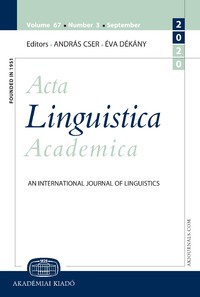A comparative study of possessive construction in Kurdish and Hungarian from a cognitive perspective
A comparative study of possessive construction in Kurdish and Hungarian from a cognitive perspective
Author(s): Rahman Veisi Hasar, Zaniar NaghshbandiSubject(s): Finno-Ugrian studies
Published by: Akadémiai Kiadó
Keywords: nominal possession; predicative possession; reference-point model; Ezafe; ergativity; Kurdish; Hungarian
Summary/Abstract: The present paper seeks to investigate the characteristics of possessive constructions in Kurdish (the Central variety also known as Sorani) and Hungarian from a cognitive viewpoint. Starting with nominal possessive constructions, which include attenuated possessors and nominal possessees, we will argue that both Kurdish and Hungarian make use of essentially similar typological strategies to encode the possessive relationship. Moreover, the defining characteristics of nominal possessive constructions in both languages will be justifiably accounted for through the same lines of cognitive argumentation in terms of Langacker's reference-point model (2008, 2009). However, a different cognitive treatment is proposed for cases in which the possessor and the possessee are nominal and linked to each other via an Ezafe. We will argue that Ezafe, which links the nominal head to its dependents in a Noun Phrase (Qharib et al. 1971; Moiin 1984; Ghomeshi 1997; Lotfi 2014), evokes an intrinsic asymmetric relationship between the possessor as the landmark and the possessee as the trajector. As the second major type of possessive constructions elaborated on in this paper, the predicative possessive is first classified into topic-possessive and be-possessive categories. Despite their subtle structural differences, it is again shown that both Kurdish and Hungarian employ almost similar clausal patterns to form both categories of predicative possessives, and the same cognitive models can be brought into play to account for their underlying characteristics. The final section of the present paper is devoted to the so-called ergative constructions in Kurdish. Seeking to propose a new cognitive approach to account for the peculiarities of the non-accusative alignment, we will argue that the so-called ergative constructions in Kurdish are conceptually linked to predicative possessive constructions.
- Issue Year: 68/2021
- Issue No: 3
- Page Range: 318-349
- Page Count: 32
- Language: English
- Content File-PDF

